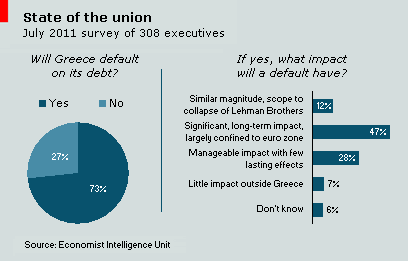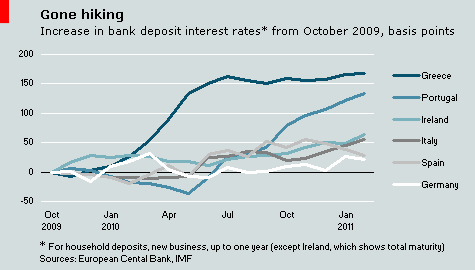You are currently browsing the tag archive for the ‘Greece’ tag.
A new survey of executives by the Economist Intelligence Unit adds another perspective to the all-but-inevitable event roiling financial markets: a Greek default. Nearly three-quarters of more than 300 executives polled by the EIU over the past week believe that Greece will eventually default on its debt. (For the full survey results, visit the EIU’s Business Research site.)
On Monday, euro area finance ministers released a statement calling for a “broader and more forward-looking policy response” to Greece’s ongoing struggles with its crushing debt burden. On the same day, Greek prime minister George Papandreou added his thoughts on the matter, warning that “if Europe does not make the right, collective, forceful decisions now, we risk new, and possibly global, market calamities due to a contagion of doubt that will engulf our common union.”
In the EIU’s survey, a small but noteworthy minority of respondents, 12%, think that the impact of a Greek default will be of a similar scale and magnitude of the collapse of Lehman Brothers in 2008. A larger share of executives, 47%, predict a significant, long-lasting impact, but with the pain largely confined to the euro area. The remaining respondents either expect little impact or weren’t willing to hazard a guess.
With Greece’s benchmark bonds trading at half of face value, and spreads for Spain and Italy recently touching euro-era highs, officials are scrambling to stem the contagion from the monetary union’s troubled periphery. There is talk of an emergency euro summit on Friday, when release of the EU’s bank stress tests could destabilise markets further. But true to form, euro area officials are finding it difficult to come to an agreement on whether to meet or not.

Analysts are poring over new statistics on debt exposure from the Bank for International Settlements released today. As has become customary with each quarterly release of this data, the report’s (virtual) pages are flipped directly to the section detailing the size of banks’ portfolio of bonds issued by governments on the euro area’s troubled periphery.
French and German banks are the most exposed, by far, to troubled government debt. Although banks have been reducing their exposure—the value of debt from Greece, Ireland, Portugal and Spain held by foreign banks fell by 35% last year—significant holdings remain. German banks, for example, were sitting on more than 40% of the US$54bn in foreign-held Greek government debt at the end of 2010.
The inevitable restructuring of Greek debt will be painful for lenders, although the severity will vary according to the method employed. In the meantime, attempts to cajole banks into a voluntary refinancing of Greece’s daunting debt pile (along the lines of the “Vienna Initiative” in central and eastern Europe) will continue, despite a glaring lack of incentives for lenders to take part.

As ever, the IMF’s latest Global Financial Stability Report is worth a look, not least because the organisation’s chart makers seem to be getting a lot more creative. Some of the infographics in the report’s latest edition verge on the psychedelic.
More importantly, however, the IMF issues a stern rebuke to financial regulators for “incomplete policy actions and inadequate reforms”. The global banking system remains vulnerable to shocks, as some lenders remain “caught in a maelstrom of interlinked pressures”, the IMF warns.

Euro area banks are singled out as particularly vulnerable. Thinly capitalised and more reliant on wholesale funding than many of their counterparts elsewhere, some of the currency union’s banks—particularly those in the bloc’s troubled periphery—are now shut out from most funding markets. This is reflected in the interest rates that the most desperate banks are offering on deposits, seeking to reduce their reliance on official support by luring funds from wary savers.
The rate hikes by Greek, Portuguese and Irish banks in recent months have been significant, dampening these institutions’ profitability and prolonging an already protracted recovery process. Another interesting conclusion to draw from the chart—adapted from the one that appears in the IMF’s report—is that banks in Italy seem relatively more desperate for deposits than banks in Spain.
 The shares of Athens-listed banks leapt by more than 8% today following a flurry of good news. Greece’s ten-year sovereign bond spread dropped below 800 basis points over German bunds. Equity strategists upgraded their opinion of the country’s shares. Finally, and perhaps most importantly from a psychological standpoint, Piraeus Bank managed to raise just over €800m in a rights issue.
The shares of Athens-listed banks leapt by more than 8% today following a flurry of good news. Greece’s ten-year sovereign bond spread dropped below 800 basis points over German bunds. Equity strategists upgraded their opinion of the country’s shares. Finally, and perhaps most importantly from a psychological standpoint, Piraeus Bank managed to raise just over €800m in a rights issue.
These are all encouraging developments, but conditions for Greek lenders remain dire. The ten-year government bond yield, at around 11%, remains unsustainable. The equity upgrade, by Credit Suisse, was merely from “underweight” to “benchmark”, hardly a ringing endorsement. And despite Piraeus Bank’s capital-raising success and today’s surge in banks’ shares, the lenders still trade at deep discounts to book value; markets rate Piraeus Bank’s assets at only 35 cents on the euro.
It was a rare good day to be a Greek bank. Suggestions that the European Central Bank may extend its government bond purchasing programme gave hope to lenders sitting on stores of shunned “peripheral” euro-zone bonds. But even after today’s boost, Greek bank shares closed at around half of their value at the start of the year. Recently published financial results from the country’s largest lenders showed steadily rising provisions against sour loans, with little sign of a let-up any time soon.

Your correspondent spoke at a corporate finance conference in Nicosia today, where much of the talk was about Tuesday’s downgrade of Cyprus by Standard & Poor’s. The ratings agency cited Cypriot banks’ exposure to souring Greek debt as an important factor in its decision. The country’s large banking sector—assets are worth nearly 700% of GDP—came in for criticism by corporate executives at the event, but not necessarily for the prominence the banks received in S&P’s statement.

Stubbornly high interest rates on bank loans are irking corporate borrowers; they pay similar rates today as in early 2008, despite the steep fall in benchmark euro area interest rates over this period. Bankers argue that this is because their funding costs are much higher than elsewhere in the euro area, as they compete for deposits with liquidity-hungry Greek banks and a sprawling co-operative sector that offers high rates for political, rather than economic, reasons. What’s more, one banker said, many of the loan applications he sees are related to restructuring instead of growth, and taking on “other banks’ problems” doesn’t appeal. With heavy exposure to Greece’s teetering economy, Cypriot banks have plenty of scope for problem-solving within their existing loan portfolios for some time to come.
As financial markets anxiously await the results of stress tests on Europe’s largest banks, questions are being asked about the level of detail that will be provided on lenders’ exposure to troubled sovereign debt. After all, a key aspect of the test is the ability of Europe’s banks to withstand a “sovereign risk shock”.
New data from the Bank for International Settlements (BIS) provides some new, if vague, clues on banks’ exposure to the countries most at risk under the stress test’s sovereign-shock scenario. The BIS data, updated through the end of March, gives the total exposure of a country’s banks to borrowers abroad. It does not break out the types of debt—personal, commercial, sovereign—but instead gives a general indication of which banks might be the most exposed to Europe’s trouble spots.
Not surprisingly, most banks trimmed their exposure to Greece, Portugal and Spain in the three months to March. The top creditors to Greece and Spain—French and German banks, respectively—cut their lending in the countries by double-digit percentages in the first three months of the year. Meanwhile, in a show of southern European solidarity, Portuguese banks increased their exposure to Greek borrowers by 20%.


The bad news in Greece keeps coming, with a fresh wave of downgrades hitting the country’s sovereign credit rating as well as those of its largest banks. Little solace can be found in the EIU’s latest financial services report for Greece (link for subscribers; link to online store for non-subscribers).
Our latest forecasts for the Greek financial sector feature both a contraction in credit and a flight of deposits in the coming years. Banks’ significant holdings of government debt also risk significant write-downs when, as the EIU expects, Greece will need to restructure its debt in 2012, before it returns to the markets to refinance its formidable borrowing requirements in 2013.
If, as the saying goes, you are judged by the company you keep, Greece is running with the wrong crowd.

Despite European Union officials dismissing talk of a debt restructuring and reportedly boosting the size of a joint aid package with the IMF, traders of credit default swaps on Greek sovereign debt have taken a dim view of the country’s ability to service its debts.
A year ago, Greek CDS spreads traded in a similar range to Israel and Malaysia. Today, the spreads on Greek CDS place the country in very different company. Sandwiched between Ukraine and Argentina, Greece is now among neighbours who are no strangers to default.
The plight of Greek banks has been a frequent topic of conversation on this site in recent weeks. Now that the country has announced it will draw on emergency aid from other euro-area countries and the IMF, these lenders—who are heavily exposed to rapidly souring sovereign debt and particularly reliant on the ECB for liquidity—have come under further pressure.
In late trading today, the spread on credit default swaps for Greek sovereign debt soared above the spreads for swaps written on the country’s largest banks. This says less about the safety of the banks than it does about the scale of the Greek state’s fiscal distress.


